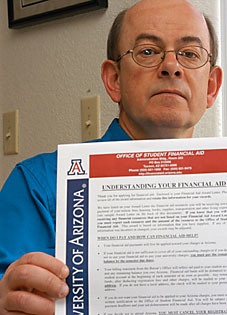 |
|
WILL SEBERGER/Arizona Daily Wildcat
|
Mario Vassallo, father of UA business sophomore Rebecca Vassallo, holds up a financial aid statement from UA. Vasallo's family is one of many dealing with a potential tuition hike.
|
|
By Keren G. Raz
Arizona Daily Wildcat
Wednesday March 5, 2003
When Mario Vasallo moved to Arizona from New York three years ago, he couldn't believe how little it would cost to send his daughter to the UA.
"When I came here, I said, ╬Wow, this is great! This is cheap,'" he said.
But when Vasallo sends his youngest daughter to the UA in two years, that bargain price may no longer exist.
Tomorrow President Pete Likins will ask the Arizona Board of Regents to approve a $1,000 tuition increase, the largest in UA history, and almost all the regents, including Gov. Janet Napolitano, have said they support the tuition increase.
Although most of the focus of this year's tuition debate has been on administrators, students and regents, many parents will end up disbursing the extra $1,000 to pay for their children's education.
Likins has said that he wants those parents who can afford their children's education to pay more than $2,500 for tuition.
Over 50 percent of incoming freshmen in 2001-2002 said that their parents earn more than $65,000, according to an assessment and enrollment research survey.
 |
|
My reason for support for any tuition hike is that the money's going into programs and not going into financial aid...
- Betsy Woolf, UA parent
|
 |
But still, some parents say the increase is a small price to pay to ensure that their children receive college degrees from a reputable institution.
"My major interest (in a tuition increase) is to see the university system here in Arizona considered one of the top in the country," Vasallo said.
Some parents of resident undergraduates and out-of-state undergraduates say they understand the need for a significant tuition increase to help cover $31 million in state funding cuts over the past two years.
Laurette Gutierrez, a bookkeeper whose daughter is a UA sophomore, said she has resigned herself to the fact that the UA needs tuition dollars now more than ever.
"I think most people are just accepting it, myself included, because what else is there to do?" she said.
But Gutierrez, like many parents, would prefer a gradual tuition increase, giving her more time to make necessary lifestyle changes to adapt to a $1,000 hike.
"It'd be nice to have a gradual tuition increase rather than Boom! $1000 bucks," she said.
The UA currently has the lowest tuition in the country, and according to regents' policy, it cannot go any higher than the top of the bottom one-third percentile. A $1,000 tuition increase would immediately bump UA up to around 35th, the top of the bottom one-third percentile.
"Look at the environment we're in right now," said Provost George Davis. "We need money to be able to support our programs."
For many parents, programs are an important driving force behind a tuition increase, but Likins has made it clear that he wants to raise tuition significantly with the primary purpose of increasing financial aid.
The proposal he will present to the regents sets aside 60 percent of the tuition revenue for financial aid.
The idea of putting money into financial aid over academic programs troubles some parents.
"My reason for support for any tuition hike is that the money's going into programs and not going into financial aid, unless they can prove a student can't afford to go anywhere," said Betsy Woolf, an editor in New York and the mother of a UA sophomore.
Woolf not only pays around $11,000 for her son to attend UA, but if Likins gets his way, she will have to pay an additional $1,250 for out-of-state undergraduates.
She said she's concerned about those students who do not receive financial aid but will struggle to come up with another $1,000.
"Don't pull the plug on the kid who needs financial aid and then looks at a bill $1,000 higher than expected," she said.
However, other parents said they would hope that a significant portion of tuition revenue would go toward financial aid to help those students who can't afford a college education.
"The education should be for everyone," Gutierrez said.

